|
|
|
Sort Order |
|
|
|
Items / Page
|
|
|
|
|
|
|
| Srl | Item |
| 1 |
ID:
082494
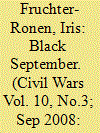

|
|
|
|
|
| Publication |
2008.
|
| Summary/Abstract |
Soon after the 1967 War, the Palestinian Resistance Movements (PRM) which established themselves in Jordan challenged Jordan's authority presenting a military and even existential threat to Hashemite rule. The prestige of the fedayeen as the primary torchbearers of the struggle against Israel rose dramatically following the Karameh Operation of March 1968, which was perceived as a military victory by the PRM and entrenched its legitimacy. The period between the Karameh raid and September 1970 was characterized by the strengthening of the fedayeen organizations and their entrenchment in Jordan by means of the establishment of autonomous military, political, and social institutions. The bloody events of September 1970-July 1971 induced a change in Jordan's official ideological line and marked a significant step in the coalescence of Jordanian national identity. From then on, the particularist trans-Jordanian identity in Jordan was emphasized more explicitly, along with such other attributes of this identity as Bedouin tribal identity, Islamic identity, and Hashemite identity
|
|
|
|
|
|
|
|
|
|
|
|
|
|
|
|
| 2 |
ID:
132964
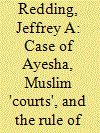

|
|
|
|
|
| Publication |
2014.
|
| Summary/Abstract |
This paper aims to challenge the disparagement of non-state Islamic systems of law that has established firm roots in contemporary rule of law ideology and practice around the world, from India to Ontario. In this respect, rule of law ideology has tended to ignore actual mechanics and procedures of law, not only in legal venues outside the state's direct control, but also in the state's courts themselves. With respect to non-state legal venues-and especially non-state Islamic legal venues-such ideology understands and describes the practices and procedures that it finds in these non-state venues as crude and underdeveloped at best, and illiberal and in violation of the rule of law at worst. While other scholarly work has vividly demonstrated the various transformations and mutations that any state's 'ideal legal procedure' experiences as it is put into real-world practice by a state's courts and judges, this paper makes a converse move. Using a case-study focused on the circumstances and experiences of an Indian Muslim woman, 'Ayesha', who recently used a Delhi dar ul qaza to exercise her Islamic divorce rights in India, this paper demonstrates how a non-state Islamic legal venue behaves in ways which are highly evocative of rule of law ideology's idealization of state courts and how they (should) operate procedurally. In doing so, this paper provides evidence for Partha Chatterjee's thesis as to how elite and subaltern domains-understood here to be embodied in both state and non-state legal venues, respectively-are products of 'mutually conditioned historicities'. In this case, the focus is on the state's conditioning of the non-state. As a result, rule of law ideology's state-oriented critique of the (Islamic) non-state is mistaken because, as this paper demonstrates, the non-state is produced in conversation with the state; one cannot critique the one (non-state) domain without realizing how that critique implicates the other (state) domain.
|
|
|
|
|
|
|
|
|
|
|
|
|
|
|
|
| 3 |
ID:
066527
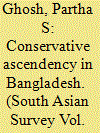

|
|
|
| 4 |
ID:
080884


|
|
|
|
|
| Publication |
2008.
|
| Summary/Abstract |
How will the strategy of spreading democracy affect the threat of terrorism from Al Qaeda and likeminded Islamic extremist groups? This article analyzes how spreading democracy would impact four different sets of underlying motivations that lead to this kind of terrorism. It will show that the widespread belief in the power of democracy is likely misplaced because democracy will be unlikely to change perceptions of occupation, will itself threaten Islamic identity and culture, will be unlikely to mitigate economic grievances, and will be unlikely to provide a more legitimate government than one based on religious law.
|
|
|
|
|
|
|
|
|
|
|
|
|
|
|
|
| 5 |
ID:
079978


|
|
|
|
|
| Publication |
2007.
|
| Summary/Abstract |
This essay maps the various Arab opinions regarding Turkey's possible accession to the European Union. The main argument is that most Arab leaders prefer to abstain from adopting a clear posture given the uncertainty surrounding the question. Arab intellectuals, in general, tend to support Turkey's accession, while at the same time they express some skepticism with regard to European willingness to actually admit Turkey to the EU. Arab discourse, however, also reflects the fears of a society concerned with the possible erosion of Turkey's Islamic identity as a result of its accession to the EU and implications of that for the Arab world. By evading the issue of Turkey's accession to the EU, Arab and Islamic elites are making a serious mistake. Whether the EU is going to admit Turkey or reject its membership, the ramifications for the Arab world will be significant. Therefore, the leaders of the Arab states should be advised to begin seriously addressing this question
|
|
|
|
|
|
|
|
|
|
|
|
|
|
|
|
| 6 |
ID:
109545
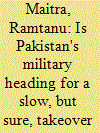

|
|
|
| 7 |
ID:
117461
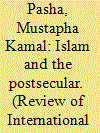

|
|
|
|
|
| Publication |
2012.
|
| Summary/Abstract |
The language of the 'postsecular' acknowledges the enduring presence of faith in politics, repudiating secularisation theses claiming diminution or privatisation of religion in social and political life. In cognitive and experiential worlds, those presumably unfettered by these conceptions (for example, the Islamic Cultural Zones or ICZs), the postsecular presents a different order of challenge and possibility. The term ICZs refers to Muslim majority areas informed by transnational subjectivities loosely connecting varied Islamic societies around symbolic commonality, memory, and historical experience. The term stresses the plurality of Islamic cultural experience, albeit distinguished by recognisable semiotic markers, without essentialising Islamic identity. This article questions the hegemonic view pervasive in both secular and postsecular theorising of the fiction of immutability of faith in the ICZs and recognises its rupture and displacement under conditions of late modernity. The ontological dislocation in the character of religion itself under conditions of late modernity opens up the possibility to account for the assumed resistance of Islam to secular modernity, but also to explain Islam's imbrications in politics read under the sign of Political Islam. Paradoxically, under the condition of late modernity, a more homogenised Islam appears to crystallise in the ICZs at odds with an 'open' Islam.
|
|
|
|
|
|
|
|
|
|
|
|
|
|
|
|
| 8 |
ID:
067784
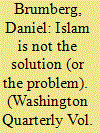

|
|
|
| 9 |
ID:
160014
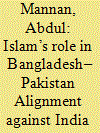

|
|
|
|
|
| Summary/Abstract |
This article engages with Bangladesh’s policy of seeking alignment with Pakistan, pursued by the Bangladesh Nationalist Party (BNP) government in different tenures from the 1990s on. In this endeavour, the article takes into account the BNP’s politics of Islamic identity as a key variable of analysis. This identity factor tacitly presents Bangladesh, Pakistan and India as ‘Muslim Bangladesh’, ‘Muslim Pakistan’, and ‘Hindu India’, respectively. It frames ‘Muslim Pakistan’ as a mutual ally of ‘Muslim Bangladesh’ and shares with Pakistan a view of ‘Hindu India’ as the enemy-other. It operates in foreign policy through domestic politics in Bangladesh, wherein for the BNP, being anti-Indian is synonymous with being pro-Islam. It is claimed in this article that this politics of Islamic identity draws Bangladesh into an alignment with Pakistan, dragging Bangladesh into Pakistan’s own conflict with India.
|
|
|
|
|
|
|
|
|
|
|
|
|
|
|
|
| 10 |
ID:
120597


|
|
|
|
|
| Publication |
2013.
|
| Summary/Abstract |
This paper concerns the level of wellbeing experienced by Swedish Muslim youths and young adults as well as the ways in which this is influenced both positively and negatively by their sense of Islamic religious identity. Taking Akerlof and Crantons' Treatise on "identity economics" as its point of departure, the paper explores, discusses and analyses the following two questions: (1) what are the contexts in which identification with Islam tends to facilitate the wellbeing of Swedish Muslim youths and young adults; and (2) what are the contexts in which identification with Islam tends to destabilize (or increase the sociocultural discomfort of) this same group. Here, the notion of Islam as a "resource" is important, since this underlines its potential to resolve the types of existential dilemmas that are often found to confront the young and undermine their sense of wellbeing. The paper bases its assessments on the results of a questionnaire concerning life, values, relations, leisure time activities and religion that was distributed to a total of 4,000 young Swedes, a certain number of whom identified themselves as "Muslims". Apart from studying the survey's Muslim-specific results, I have conducted a number of additional interviews with young Muslim respondents, aiming to extend our understanding beyond the strictly quantitative findings of the material. The survey indicates that, much like their Christian counterparts, a majority of the Muslim respondents considered their belief in Islam to be a private, personal matter; one-third described themselves as "seekers"-an identification that previous research has found to be associated primarily with secular majority youth. The results further indicate that a majority of Muslim youths have a low level of confidence in religious leaders and that very few are actively involved in mosque activities and the like; on the contrary, they prefer to spend their leisure hours earning money, being with friends and/or "working out" at the gym. While the survey found that the vast majority of Muslim respondents looked upon the social and spiritual dimensions of Islam as a positive resource, the interviews indicate that the ability of young Muslims to appropriately shift between different forms of cultural belonging is highly advantageous as well.
|
|
|
|
|
|
|
|
|
|
|
|
|
|
|
|
| 11 |
ID:
064606
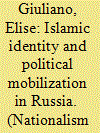

|
|
|
| 12 |
ID:
108524
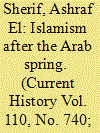

|
|
|
| 13 |
ID:
132979
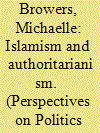

|
|
|
|
|
| Publication |
2014.
|
| Summary/Abstract |
Based on the texts of the five works under review here and what we know about the pace of academic publishing, it is clear that the bulk of the analysis provided in each was written prior to the waves of demonstrations and protests that swept the Arab region beginning in December 2010. One can only imagine how many scholars of Arab politics with books in process were faced with the dilemma of whether a chance to revisit the text was worth delaying publication or mourning the passing of the opportunity to make that decision. The authors of three of the works under review were able to incorporate some analysis of events that were only unfolding as the texts went to press, in prefaces, introductions, conclusions, and codas. The two authors who did not have or take the opportunity to reference the uprisings are no poorer as a result. For the most part, each of these books contributes something important to our understanding of the recent political upheavals and changes that continue to unfold.
|
|
|
|
|
|
|
|
|
|
|
|
|
|
|
|
| 14 |
ID:
001694


|
|
|
|
|
| Edition |
1st ed.
|
| Publication |
London, Routledge, 1997.
|
| Description |
xxix, 274p.pbk
|
| Standard Number |
0415149665
|
|
|
|
|
|
|
|
|
|
|
|
Copies: C:1/I:0,R:0,Q:0
Circulation
| Accession# | Call# | Current Location | Status | Policy | Location |
| 041053 | 954.035/AHM 041053 | Main | On Shelf | General | |
|
|
|
|
| 15 |
ID:
048099


|
|
|
|
|
| Publication |
Oxford, Oxford University Press, 1997.
|
| Description |
xxix, 274p.: plates, mapshbk
|
| Standard Number |
019577843X
|
|
|
|
|
|
|
|
|
|
|
|
Copies: C:1/I:0,R:0,Q:0
Circulation
| Accession# | Call# | Current Location | Status | Policy | Location |
| 042581 | 954.035/AHM 042581 | Main | On Shelf | General | |
|
|
|
|
| 16 |
ID:
108526
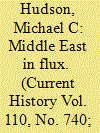

|
|
|
| 17 |
ID:
132960
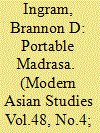

|
|
|
|
|
| Publication |
2014.
|
| Summary/Abstract |
In the first decades of the twentieth century, classically trained Muslim scholars (`ulama) of the influential Deobandi school of North India issued a number of immensely popular, mass-printed 'primers' on Islamic belief and ritual practice. Now ubiquitous in the Islamic bookshops in South Asia and elsewhere, these primers sought to summarize the rudiments of an Islamic education for a nascent lay Muslim reading public. Focusing on three Deobandi `ulama-Ashraf `Ali Thanvi (d. 1943), Mufti Muhammad Kifayatullah (d. 1952), and Muhammad Manzur Nu`mani (d. 1997)-this paper explores how their primers advanced the Deobandi school's well-known critique of popular piety even as they claimed to address Muslims generally, and how their authors negotiated the subtle dynamics of print. Understanding the potentially subversive power of print to open a space for readers to form their own interpretations of minute doctrinal matters and the threat of mass-printed religious texts to their own authority, these `ulama implored readers to refrain from forming their own opinions of the primers' content and to consult the `ulama throughout the reading process. Thus, even as they took advantage of print's possibilities, they remained deeply suspect of its ramifications.
|
|
|
|
|
|
|
|
|
|
|
|
|
|
|
|
| 18 |
ID:
060506


|
|
|
| 19 |
ID:
102821


|
|
|
| 20 |
ID:
133743
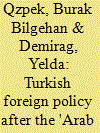

|
|
|
|
|
| Publication |
2014.
|
| Summary/Abstract |
This article explores Turkey's changing foreign policy approach towards the Middle East after the spread of the Arab upheavals to Syria. Instead of preserving the status quo, Ankara has turned to a revisionist state that has begun to threaten Middle Eastern governments. While Turkey was reluctant to join the foreign military interventions against Middle Eastern regimes, (e.g. Libya) it has been instrumental in immersing NATO in the Syrian civil war. Such transformation ultimately undermines analyses that define Turkey as the kingmaker of the Middle East.
|
|
|
|
|
|
|
|
|
|
|
|
|
|
|
|
|
|
|
|
|